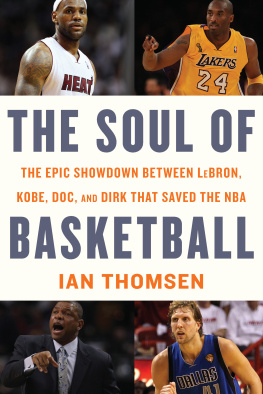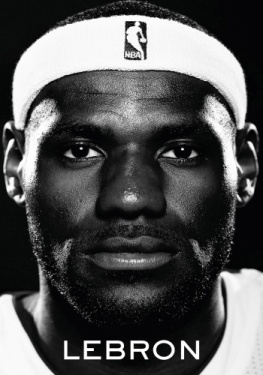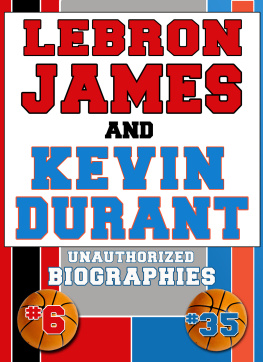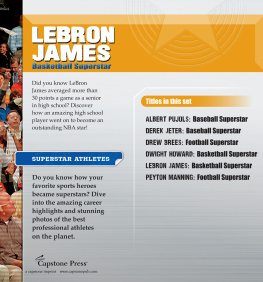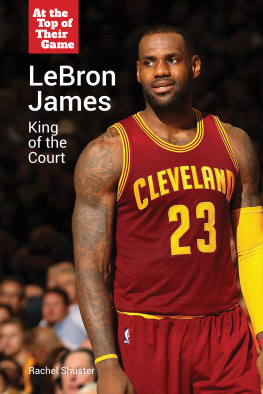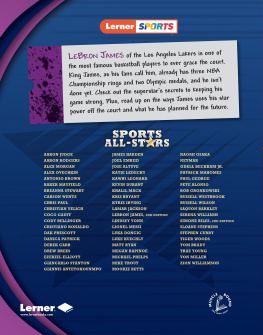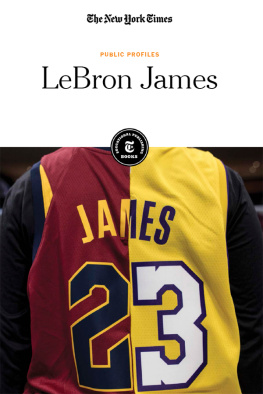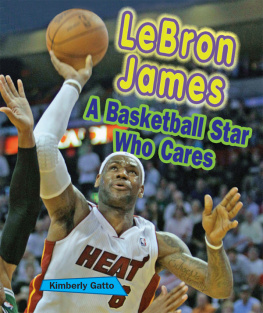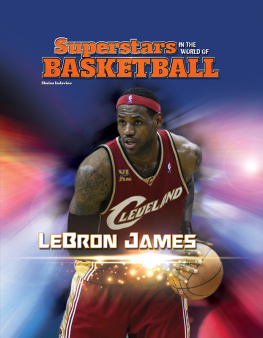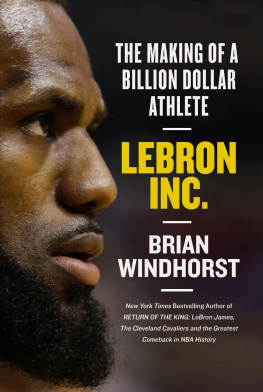Copyright 2018 by Ian Thomsen
All rights reserved
For information about permission to reproduce selections from this book, write to or to Permissions, Houghton Mifflin Harcourt Publishing Company, 3 Park Avenue, 19th Floor, New York, New York 10016.
hmhco.com
Library of Congress Cataloging-in-Publication Data
Names: Thomsen, Ian, author.
Title: The soul of basketball : the epic showdown between LeBron, Kobe, Doc,and Dirk that saved the NBA / Ian Thomsen.
Description: Boston : Houghton Mifflin Harcourt, 2018. | Includes index.
Identifiers: LCCN 2017050919 (print) | LCCN 2017046213 (ebook) | ISBN 9780547746890 (ebook) | ISBN 9780547746517 (hardcover)
Subjects: LCSH: National Basketball AssociationHistory. | BasketballUnited StatesHistory. | James, LeBron. | Bryant, Kobe, 1978 | Rivers, Glenn. | Nowitzki, Dirk, 1978
Classification: LCC GV885.515.N37 (print) | LCC GV885.515.N37 T56 2018 (ebook) | DDC 796.323/64dc23
LC record available at https://lccn.loc.gov/2017050919
Cover design by Brian Moore
Cover photographs Mike Ehrmann / Getty Images (LeBron James); Jeff Gross / Getty Images (Kobe Bryant); Elsa / Getty Images (Doc Rivers); Ronald Martinez / Getty Images (Dirk Nowitzki)
Author photograph Stan Grossfeld
v1.0318
For Jacqueline
Christopher
Maureen
I will not follow where the path may lead, but I will go where there is no path, and I will leave a trail.
Muriel Strode
Jazz music explains... what it means to be American. Which is that its a process. And democracy is a process. Its not always going to go your way. Sometimes you have to play that riff and listen to what somebody else is playing. Jazz believes in freedom of expression. But it also believes in people communicating with each other. A lot of times things might not work out. But theres always another time.
Wynton Marsalis
Prologue: The Fairy Tale
So, asked the interviewer hired by LeBron James to interview him in front of a live TV audience, does the team that youre going to, that youll announce in a few minutesdo they know your decision?
Uh, they just found out, LeBron replied.
They just found out? Even LeBrons accomplice looked surprised.
Yeah.
So the other five, on pins and needles, they dont know. Theyll be listening to this?
Right, LeBron said.
LeBron, 25 years old, was the most precious free agent of the new lucrative era that had been pioneered decades earlier by Michael Jordan. A half-dozen franchises of the National Basketball Association had convinced LeBron to consider playing for them, and the other twenty-four teams were unmistakably envious. At 6 feet 8 inches tall and more than 260 pounds, LeBron was on his way to becoming the most versatile star in the short history of the NBA. Already he had been named the NBAs Rookie of the Year, an All-Star for the ensuing six seasons and the leagues Most Valuable Player the past two years.
In prime time, on national TV, LeBron was about to announce which lucky franchise would be given the opportunity to pay him more than $15 million annually.
Do you have any doubts about your decision?
Um, no, LeBron said unconvincingly. I dont have any doubts at all.
His body language betrayed his words. It appeared to be occurring to LeBron just now, on TV screens throughout America, that he was not yet everything that he was cracking himself up to be. LeBron had been hailed since adolescence as the second coming of Michael Jordan, and yet he had not come close to leading his hometown team, the Cleveland Cavaliers, to the NBA championship. That was the problem with this outlandish production, which he had created for himself. He looked anxious.
Would you like to sleep on it a little longer, or are you ready to make this decision?
All around the country people were yelling for LeBron to get to the point. His made-for-TV event had been on the air for close to a half hour already.
Ive slept enough, said LeBron. Or the lack of sleep.
His curious vanity show, titled The Decision, was meant to take advantage of the public interest in his future. LeBron would insist that he produced his TV special to raise $2.5 million for the Boys & Girls Clubs of America, which was admirable indeed. But there was no doubt that he also viewed this reality-based infomercial as a chance to grow his own brand commercially. He paid up front for the national airtime on ESPN, and he took personal responsibility for selling the commercials and sponsorships in order to leverage his fame and extend his reach further into the entertainment mainstream.
As many as thirteen million Americans were drawn to watch The Decision by its promise of betrayal. Was LeBron putting his fans in Cleveland through needless angst before announcing that he would re-sign, after all, with the Cavaliers? Or, even worse, had he chosen the cruel gimmick of this self-serving TV show as a vehicle for abandoning his hometown team in favor of a more glamorous destinationthe New York Knicks, the New Jersey Nets (themselves on the verge of relocating to chic Brooklyn), the Chicago Bulls, the Los Angeles Clippers, or the Miami Heat?
LeBrons decision was being driven by his desire to win at the highest level and define himself as an NBA champion. But his conceit of The Decision was burying that lead. LeBron, inexplicably, was taking himself out of context in order to satisfy the prime-time format of reality TV.
So why was he choosing to cast himself as the villain? The cynicism of his fiasco was inconsistent with the high-minded devotion to teamwork that he had shown throughout his brief career. Never mind the surprise announcement that he was about to make: LeBrons active participation in his own demise would emerge as the real twist of the show.
It was being broadcast from a suburban Boys & Girls Club gymnasium that had been chosen for him in Greenwich, Connecticut, an hour north of Manhattan. LeBron had grown up playing in gyms like this, and he should have felt at home amid the two-toned cinder block, the stale smells and muted echoes. But he would find no comfort here. By the time he arrived via private jet, the little gym had been taken over by LeBrons corporate partners. The warm brown glow of the basketball court was blighted by the black-curtained stage on which LeBron and his co-host sat facing each other. There were hot lights and wires and strangers everywhere, all under frenzied pressure to synchronize the details of a live broadcast that was doomed to fail. The local children who normally might have been playing in the gym had been propped up on rows of shallow bleachers to serve as the TV backdrop to LeBron, alongside a banner that read Great Futures Start Here. The boys and girls sat in fidgeting demonstration that LeBron was doing all of this for them rather than for himself.
A dozen years earlier LeBron might have been sitting down there looking up to his hero, Michael Jordan, for inspiration and guidance. But then, Jordan surely would have known better; he never would have made the mistakes that LeBron was making now. As LeBron sat high upon the throne of a directors chair, the scene told a story all its own, of how LeBrons fame radiated out and reshaped the order of everything that mattered to him. Too late he would realize that he had hired in the cameras and microphones without knowing how to explain himself. He was exploiting his dream before he had fulfilled its promise.
The interviewer, behaving as if everything was going terrifically, smiled his big smile and said, Are you still a nail biter?
LeBron looked wounded. He was aware that his nervous habit, as televised in close-ups during the timeouts of Cavaliers games, was viewed as a symptom of his failure to live up to the expectations that had been shadowing him since he was 16 years old. I have, a little bit, he said in his deep, resonant voice, trying to smile back while squeezing his long fingers into his lap. Not of late.

